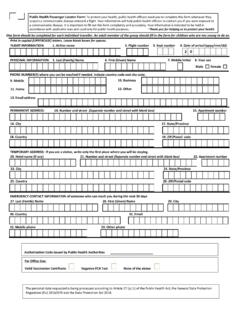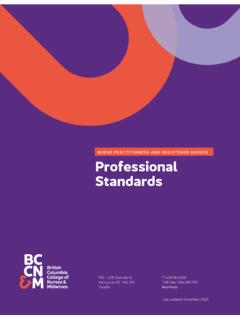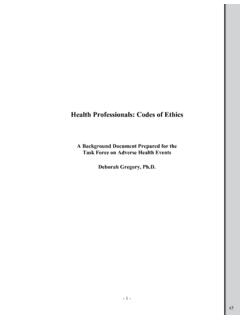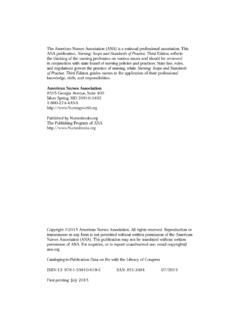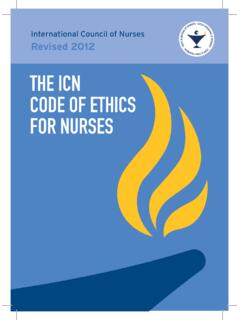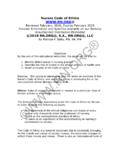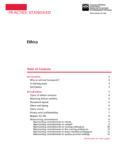Transcription of Code of Ethics and Standards of Professional Conduct for ...
1 Council for Nurses and Midwives Malta Code of Ethics and Standards of Professional Conduct for Nurses and Midwives January 2020 2 Code of Ethics and Standards of Professional Conduct for Nurses and Midwives - CNM CONTENTS Contents .. 2 Glossary .. 3 Introduction .. 5 1 Respect towards Patient .. 7 2 Upholding Professional Responsibilities and Accountability.. 12 3 Respect Towards Colleagues .. 16 4 Maintaining Public Trust and Confidence .. 19 Ethical Obligations for nurse /Midwifery Managers .. 22 Ethical Obligations for nurse /Midwifery Educators .. 23 Ethical Obligations for nurse /Midwifery Researchers .. 24 Conclusion .. 25 Bibliography .. 26 3 Code of Ethics and Standards of Professional Conduct for Nurses and Midwives - CNM GLOSSARY Accountability: being able to give an account of one s judgement, actions and omissions.
2 Adverse Event: an incident which resulted in or could have resulted in harm. Advocate: the nurse or midwife should act and support the interest of the patient or client when s/he is unable to do so for himself/herself because of his/her limitations. In advocacy, nurses and midwives have primarily, to understand accurately the patient s wishes and needs. Competence: the ability to practice safely and effectively fulfilling his/her Professional responsibility within their scope of practice. Co-workers: nurses/midwives, other health and non-health related workers and professionals. Clinical Governance: a system through which health care organisations are accountable for continuously improving the quality of their services and safeguarding high Standards of care by creating an environment in which excellence in clinical care will flourish (1).
3 Culturally Appropriate: practices that meet and respect cultural needs and differences. Delegation: The transfer of a task or activity to a competent individual who is trained and certified to carry out that particular task or activity. Evidence-Based Practice: health care decisions based on the best available evidence and clinical expertise. Inaction: failure to act in a situation where action is required. Integrity: upholding the values of the profession and the accepted Standards of practice. Omission: failure to act, especially when there is a moral or legal obligation to do. Patient: a person who uses health and social care services. In some instances the terms client , mother and individual are used in place of the term patient depending on the context.
4 Personal Health: mental, physical, social and spiritual wellbeing of the nurse /midwife. 4 Code of Ethics and Standards of Professional Conduct for Nurses and Midwives - CNM Preferential Treatment: the act of being treated better than another patient resulting in having an advantage over another patient. Responsible Carer: means the person appointed by virtue of article 4 of the Mental Health Act (2). Research Protocol: a detailed document of the research project including rationale and background information, objectives, methodology, statistical considerations and other support for the project including funds, links and/or collaboration with other researchers or institutions.
5 Social Justice: the equal access to wealth, health and wellbeing within society. Therapeutic Relationship: refers to the relationship between a nurse /midwife with their patient and their informal carers which is established to bring beneficial outcomes to the client. 5 Code of Ethics and Standards of Professional Conduct for Nurses and Midwives - CNM INTRODUCTION This Code of Ethics and Standards of Professional Conduct for Nurses and Midwives applies to nurses and midwives registered with the Maltese Council for Nurses and Midwives [CNM]. This document together with any other published documents by the CNM provides a framework for Professional accountability and responsibility of nursing and midwifery practice in all domains including clinical, management, education and research.
6 The Code contains a series of statements that taken together promotes good nursing and midwifery practice. These statements put the interests of patients and service users first, are safe and effective, and promotes trust through professionalism. They serve as a reference guide for ethical decisions that arise during practice and inform society about the ethical obligations and Professional Conduct that is expected from nurses and midwives. The Code also specifies the ethical obligations expected from management, educators and researchers over and above the generic statements. The document is useful for everyone who cares about what Professional nursing and midwifery practice is, including: Patients and service users, and their immediate carers.
7 Registered nurses and midwives to promote safe and effective practice in their place of work. Employers and organisations for quality and safety purposes. Educators to teach nursing and midwifery both at undergraduate and post-graduate level. The commitment to Professional Standards is fundamental to being part of the nursing or midwifery profession. Nurses and midwives registered with the CNM must act in line with the Code. Failure to uphold these Standards of behaviour could lead to a disciplinary investigation; and in serious cases, this can include removing the Professional from the register. The values and principles established in the code are not negotiable or discretionary.
8 Ethical principles and Standards for Professional Conduct have been grouped into four main values including: 1. Respect towards the Patient. 6 Code of Ethics and Standards of Professional Conduct for Nurses and Midwives - CNM 2. Upholding Professional Responsibilities and Accountability. 3. Respect towards Colleagues. 4. Maintaining Public Trust and Confidence in the Nursing & Midwifery Profession Each value is accompanied by a principle statement, Standards of Conduct expected and explanatory notes providing further information about the statements. The values set in the Code of Ethics and Standards of Professional Conduct acknowledges the uniqueness of every patient. It affirms the Professional commitment in treating every individual with respect and dignity, irrespective of age, nationality, gender orientation, political inclination or any other factor.
9 It also acknowledges that nursing and midwifery are independent professions with duties and obligations to fulfil. It also seeks to ensure that no action or omission by members of the professions, within their sphere of responsibility, would be detrimental to the interests, condition, or wellbeing of patient and society at large. 7 Code of Ethics and Standards of Professional Conduct for Nurses and Midwives - CNM 1 RESPECT TOWARDS PATIENT Ethical Principles As members of the professions, nurses and midwives must: Respect the dignity and individuality of patients. Respect the cultural needs and values of patients. Protect the patients human rights and do not subject patients to any torture, cruelty, or other inhumane or degrading treatment.
10 Respect and preserve patients dignity at every stage of human life. Respect patients rights to participate in decisions about their care. Provide support and where appropriate involve the patient, their families and/or significant others in the planning of their care. Within their sphere of responsibilities, ensure that patients are given adequate, correct, and timely information in a culturally sensitive manner enabling them to make a free and informed choice towards the provision of their own care. Respect patient privacy and confidentiality. Access to and disclosure of patients personal or health information must be only as necessary for providing care. Refuse any gifts, favours, or hospitality from patients which might be construed as attempts to exert influence to obtain preferential treatment.






